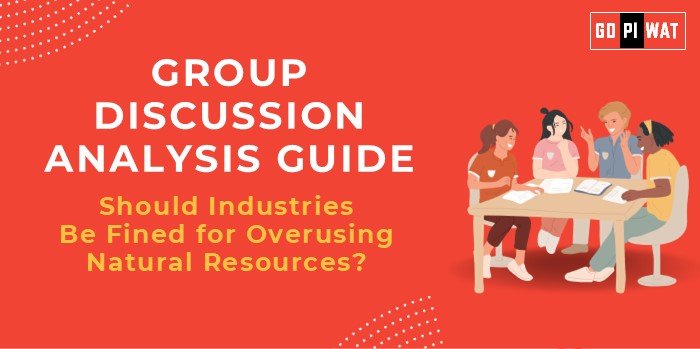📋 Group Discussion Analysis Guide
🌍 Should Industries Be Fined for Overusing Natural Resources?
📌 Introduction to the Topic
Opening Context: Industries worldwide are significant consumers of natural resources, driving economic growth but often at an unsustainable cost to the environment. This debate’s relevance lies in balancing economic imperatives with ecological responsibility.
Topic Background: The concept of fines for overuse of natural resources emerged as a mechanism to ensure accountability. Many countries have begun integrating such penalties into environmental policies, reflecting growing awareness of resource depletion’s irreversible impacts.
📊 Quick Facts and Key Statistics
- Global Resource Use: Industries account for 54% of the world’s natural resource consumption (UNEP 2023).
- Economic Cost of Depletion: $4.3 trillion annually due to environmental degradation (World Bank 2023).
- Water Overuse: Industries consume 20% of global freshwater resources, intensifying water scarcity (WWF 2023).
- Carbon Emissions: Industrial activities contribute 24% of global greenhouse gas emissions (IPCC 2022).
- Fine Implementation Success: Sweden reduced industrial pollution by 30% through strict fines and incentives (2018).
🤝 Stakeholders and Their Roles
- Governments: Establish regulations, monitor resource use, and impose fines.
- Industries: Innovate sustainable practices and comply with regulatory standards.
- Environmental NGOs: Advocate for stricter controls and transparency.
- Citizens: Demand accountability and sustainable products.
- Global Organizations: Provide international guidelines and support programs (e.g., UNEP, WWF).
✅ Achievements and Challenges
🏆 Achievements
- Sweden: Reduced industrial emissions by 30% post-implementation of fines and tax incentives.
- Circular Economy: Companies cutting resource usage by 25% through recycling models.
- Increased Awareness: Global movements driving corporate responsibility.
⚠️ Challenges
- Monitoring: Difficulty in tracking industrial resource use accurately.
- Economic Pushback: Resistance citing cost and competitiveness concerns.
- Global Comparisons: Developing nations struggle with enforcement and infrastructure.
- Case Study: India’s coal mining faces informal practices and data transparency issues.
🔗 Structured Arguments for Discussion
- Supporting Stance: “Fines ensure accountability and encourage industries to innovate, aligning economic activities with environmental goals.”
- Opposing Stance: “Over-regulation through fines can hamper industrial growth, particularly in resource-reliant developing economies.”
- Balanced Perspective: “Fines are effective but should be complemented by incentives for adopting sustainable practices.”
💡 Effective Discussion Approaches
- Opening Approaches:
- “Industries consume over half of global natural resources. Shouldn’t this come with stricter accountability measures?”
- “Sweden’s model of fines and incentives highlights how regulation can drive sustainability.”
- Counter-Argument Handling:
- “Economic concerns are valid, but data shows that fines coupled with incentives foster long-term industrial growth.”
📈 Strategic Analysis (SWOT)
- Strengths: Encourages sustainability, generates revenue for restoration.
- Weaknesses: High monitoring costs, potential economic strain on industries.
- Opportunities: Drives innovation, fosters green markets.
- Threats: Lobby resistance, relocation of industries to less-regulated regions.
🎓 Connecting with B-School Applications
- Real-World Applications: Sustainability initiatives in operations management, environmental economics projects.
- Sample Interview Questions:
- “How can fines be balanced with incentives to promote sustainable industrial practices?”
- “Discuss the role of governments in regulating resource use without stifling economic growth.”
- Insights for Students:
- Explore sustainable supply chain management.
- Understand the economic implications of environmental policies.


